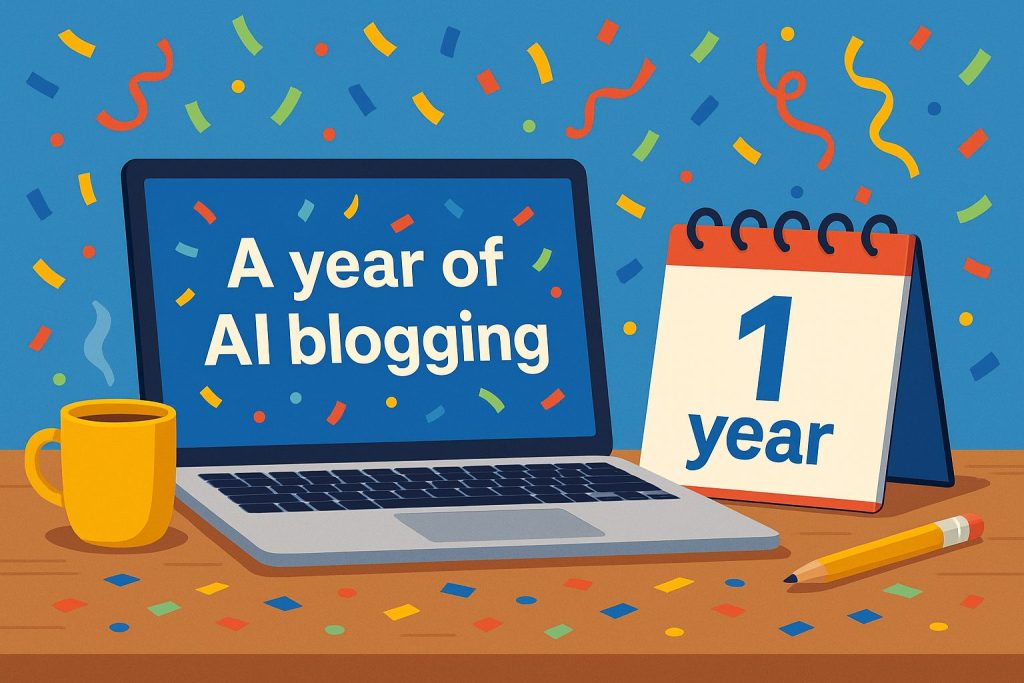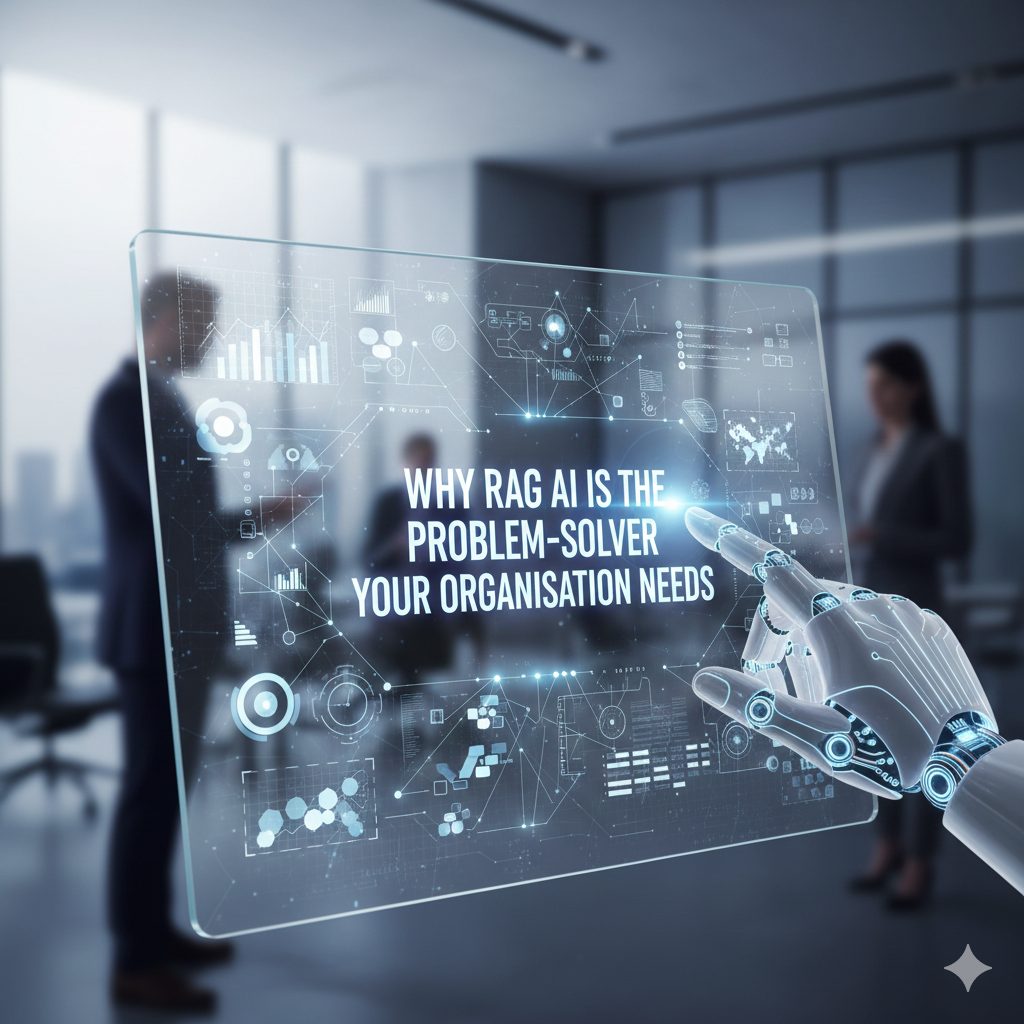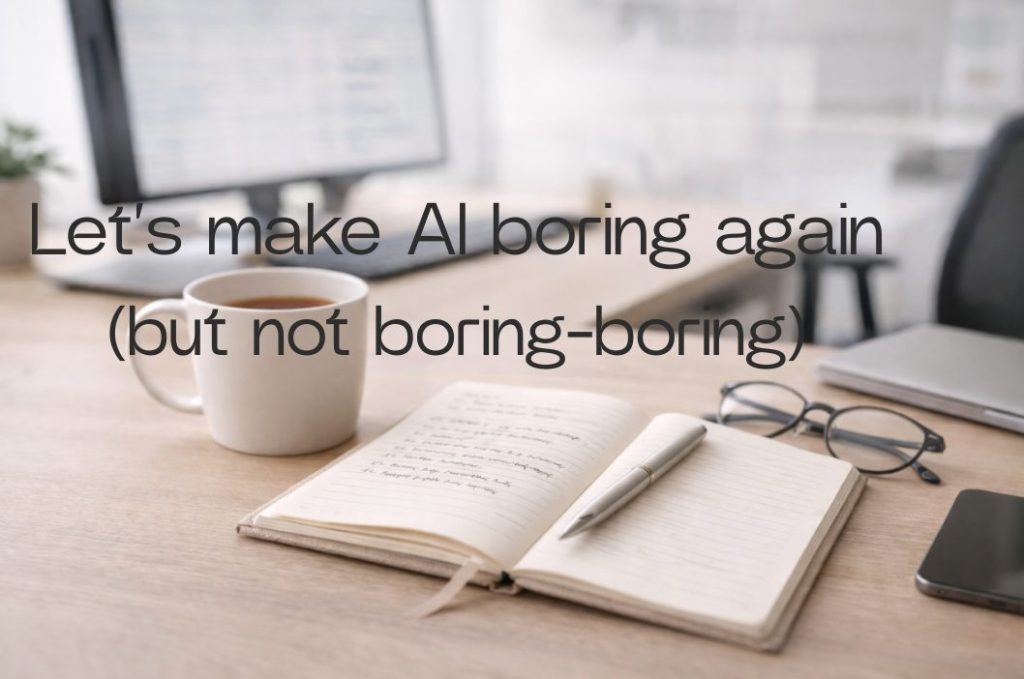
When we started writing about generative AI every week – or, more truthfully, when one of the Leading AI founders decided I should write a blog every week – we weren’t sure if people would still be reading one year on. But here we all are.
Fifty-odd blogs, more than a few tenuous analogies (all of which I stand by) and an unhealthy number of references to my pets: we’ve made it.
This week, in honour of our one-year blogiversary, we’re taking a moment to look back — not in sadness, but with an honest assessment of how our back catalogue of insights and predictions have fared, now we have a bit more scope for hindsight. Because a year is a long time in AI. So, here’s our best effort at a “what we got right, what we got wrong, what’s changed, and what is still up for grabs.”
What we got right
Change management matters more than tech.
We said this early, and we keep saying it because it’s still true and will continue to be true. Always. The best AI solution in the world won’t land if you don’t bring people with you. Whether you’re trying to support frontline public service teams or just get your staff to stop copying and pasting unchecked nonsense from ChatGPT, it’s the human change management that makes or breaks adoption. It’s why we’re so incredibly proud of North Yorkshire’s rollout of their ‘Polly’ AI, whose impact is a tribute to outstanding change management by leaders at the frontline.
RAG AI is extremely useful, and deserves to be better understood and more well used.
When we first explained RAG to our readers by way of a foul-mouthed parrot analogy, we were mainly worried people just wouldn’t be as into it as we are. Fast-forward a year and we’ve got real organisations using our RAG engines daily to make work easier, support good decisions, and save actual hours of work. There’s more to do, though: unless you think your Jackbot-of-all-trades AI solution is so reliable you that would give it to a social worker to check on procedures, you should get into RAG too.
Prompting got better.
Everyone is savvier now and we are developing our talent for getting what we want from generative AI in the same way we did with Google search, back in the day. It’s a skill. One we’re building together, in public. Carry on. I’m not even going to reshare the link to our blogs on this topic: you’ve got this.
Okay, I’ll just share this one.
The AI sustainability story is real — and complicated.
We tried to cut through some confusion in a few of our blogs, taking a balanced look at AI’s environmental impact: the cost is often overstated but real, but so is the potential to do better. The solution? Making choices that are realistic, responsible, and don’t just shift the blame to someone else’s server. Right-size your tech solution to the problem you want to solve; think about what you’re creating and storing and how necessary it really is. Energy waste is less visible but still happening. Explaining the environmental impact of AI has become the most frequently asked question in every presentation we make and every session we run. Quite right too. Your suppliers really should be able to answer the question.
Using AI isn’t cheating — unless you’re using it to cheat.
We’ve said it more than once: using AI well is a skill, not a shortcut. Using it without admitting to it, or using it lazily — unchanged US English, random headings, “I hope this email finds you well” etc — is how you out yourself as an amateur. Job applications or bids for work might look slicker at first glance because the spelling and grammar is flawless, but the same people will get booted off the shortlist in the end. Humans have not lost their nose for bullshit, however much glitter you roll it in. This felt like a niche view for a while, but the normalisation of tools like ChatGPT has made a big difference, quickly.
What we got wrong (or wrongish)
We hoped everyone would move faster.
We underestimated how many organisations would quietly ban AI tools instead of helping people use them well. It’s like hiding the calculator instead of teaching kids maths. Organisations used to deny web access too, for fear of distracting people. But then – inevitably – the competition mysteriously becomes more productive than you, with a workforce that’s more inclined to hang around. Hopefully there’s still time for everyone to catch up: put the right policies and tools in place, teach people good practice.
We thought the privacy settings would be more obvious.
So many people haven’t changed them. We have to keep reminding people to uncheck training permissions and stop feeding sensitive data into free tools. This will probably still be true next year. The same populations that worry about government surveillance or being asked for ID will still cheerfully leave a box unchecked so they can work a little faster online. Most of the answer isn’t more regulation or control, it’s education.
We were too generous about Copilot.
You probably don’t think that if you’ve read our past blogs. And we still want to like it. But a year on, Copilot is still driving new forms of tech rage. Worse, it’s driving AI apathy as people quietly quit using it (other than the AI meeting notes, which they could have got in various cheaper ways). We are not, I think, living in a golden age for patience. This is an expensive problem.
We slightly overestimated AI agents.
They’ve improved — and some are genuinely useful now — but the idea that an AI assistant could soon be seamlessly doing all the jobs you hate hasn’t quite come together as quickly as we imagined. We might have to stop saying agentic AI is the future. The big topic these days is: governance. But that’s so much less exciting. James Bond was an agent, and he gave no sign he cared for governance.
Still up for grabs
Will AI really improve productivity at scale?
We think so. The numbers look good. The early wins are real. But we’re still in the ‘potential’ zone for a lot of sectors — especially if we don’t fix digital skills, access, and uptake. The UK productivity crisis is still a Whole Thing despite moderately good economic news of late, and AI is a tool, not The Cure. We’re writing emails more quickly but also making them longer – and someone still has to read it. Maybe we should pack that in. Might help.
Bias.
The tools are better than they were. But bias creeps in when the training data hasn’t been checked, the design process wasn’t inclusive, or the test questions don’t reflect real-world users. We have to notice it — and to call it out — but we’re not done yet.
Privacy.
Still murky. Still confusing. Still something you should probably go and check in your settings right now. See above. Go on. I’ll wait.
This just in: ChatGPT learned to say “I don’t know.”
That’s progress. A year ago it would’ve confidently hallucinated its way through a wrong answer in the name of constructing the words you want to hear. Now it sometimes shrugs, says it doesn’t know, and asks if you want to look it up together. And that’s… kind of cool. When it does it. Less charming when it’s not true, because it does know but hasn’t put it together.
One year on…
We’ve covered agents, animal analogies, vendor lock-in, vending machines, and therapy. We’ve written about change, cheating, energy, trust, productivity, and cost. We’ve built many, many awesome AI tools. We’ve learned a lot. Failed fast, and solved problems. Grown. Made ourselves extremely useful indeed, and that makes us happy.
It remains a unique badge of honour that we were talking about KPop Demon Hunters long before it became Netflix’s second most-watched movie ever, serving up four out of the top five streamed songs simultaneously. What a time to be alive.
This AI thing isn’t going away and we’re all still learning, so we’ll keep showing up — every week — trying to make sense of it and hoping our advice helps you.




